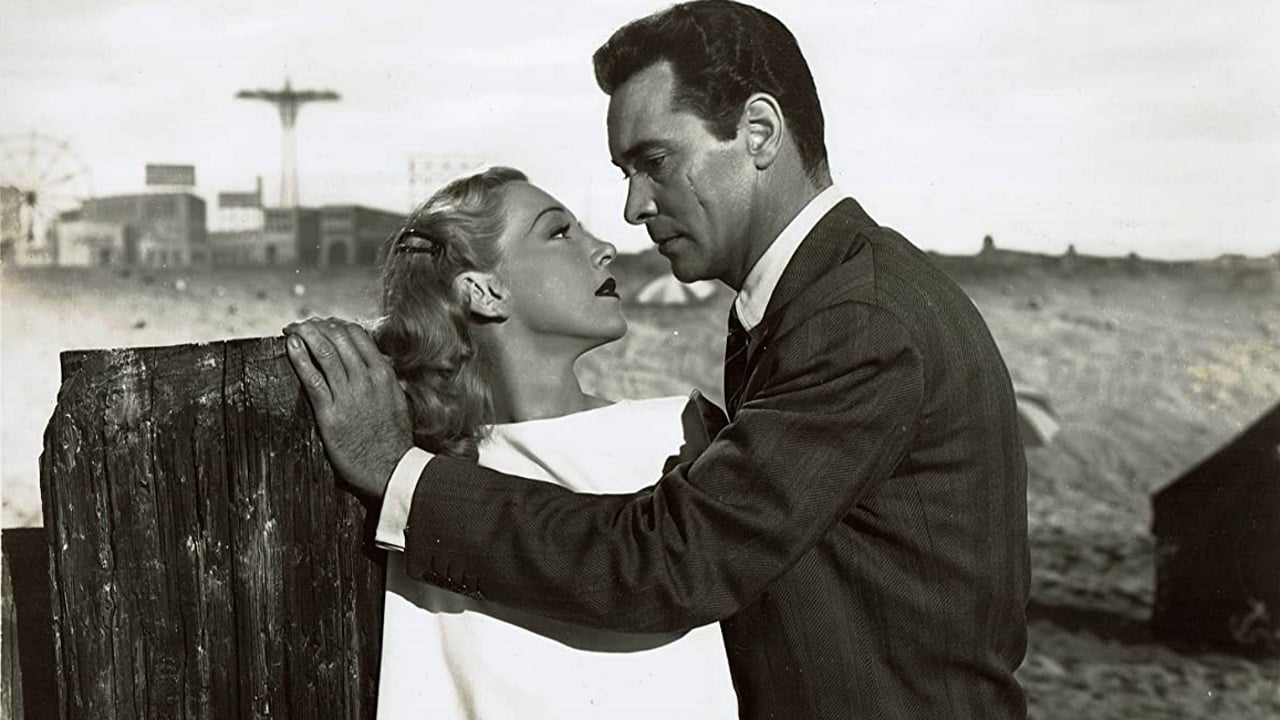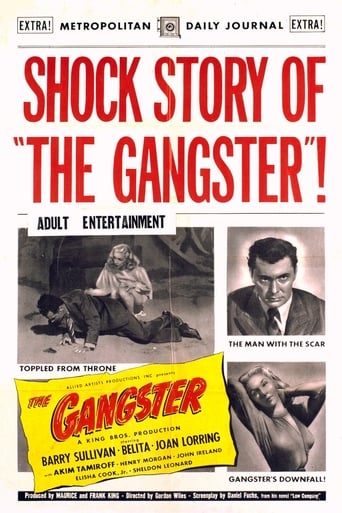

***SPOILERS*** Odd kind of crime flick that has a director Fritz Lang "M" movie like look to it about a small time racketeer Shubunka, Barry Sullivan, who's about to be put out of business not by the law but his fellow criminals. With crime boss Connell, Sheldon Leonard, muscling in on Shubunka's territory in the Neptune Beach section of Brooklyn he's given a choice in joining the party, Cornell's mob, as a $80.00 a week collector or check out of town for good. But before Shubunka makes his exit Cornell want's him to hand over a list of those businesses on the beach who pay him off for protection.Determined to hold on to his criminal enterprise Shubunka tried to recruit outside mob members, from Detroit Cleveland & Chicago, to keep Cornell and his mobster off his back but doesn't have the funds or cash to do it. As it turns out one of Shubunka's costumers and good friend ice cream and soda shop owner Nick Jammey, Akim Tamikoff, starts to crack under the pressure of the Cornell Mob and soon is forced, in order to save his life, to join them. Everything starts to fall apart for Shubunka's attempt to hold on to power and the final domino to fall is his girlfriend showgirl Nancy Starr, Belita. It's Nancy who after trying to get Shubunka to quit the crime business joined his bitter rival Cornell just to get away from the now paranoid and self destructive hood.****SPOILERS**** What was the final nail in Shubunka's coffin was something that he was totally innocent of the brutal murder of his friend soda & ice cream owner Nick Jammey. It was accountant Karty, John Ireland, who embezzled his brother in law's business whom he worked for by fixing the books who went first to Shubunka, who turned him down cold, then to Jammey for cash to prevent from getting his legs broken. In a crazed and mindless assault on Jammey, who also refused to give him the money, Karty bash his head in and killed Jammey with a frying pan. With Cornell thinking that it was Shubunka who did in Jammey for joining his outfit he out a hit on him not realizing that Shubunka was totally innocent of his murder. By now Shubunka didn't care what happened to him and with the skies opening up and the rain pouring down on him he just meekly walked out on the dark and rain soaked streets of Neptune Beach to meet what fate has in store for him and thus get his final reward.
... View More... that is who Shubunka (Barry Sullivan) is in this crime drama/noir that is quite good given that it came from poverty row outfit Allied Artists, previously known as Monogram Pictures. What can you say about a film where time is taken to paint a detailed psychological profile of a gangster and gives the film a fine supporting cast, but there is no time taken to ensure that Shubunka's scar shows up on the same side of his face throughout the film. I saw it change sides at least once! But I digress.Shubunka is in charge of "the rackets" on Neptune Beach in New York City. He makes good money, but he's blown it all on a girl he's infatuated with, night club performer Nancy Starr (Belita). His nervous partner is Nick Jammey, the owner of an ice cream parlor down on the beach. The cast in the ice cream parlor could be a movie all on its own. You have Harry Morgan as a 38 year old soda jerk who wants to get laid in the worst way but has the pedestrian lady's man skills of a 14 year old boy, you have an accountant (John Ireland as Frank Karty) who hangs out in the ice cream parlor hiding from his brothers-in-law. You see, he was in charge of their auto repair shop's books and stole 1300 dollars from them so he could gamble on the horses - ironically one of Shubunka's rackets. His in-laws intend to keep beating him up until he returns the money, and he can't go to the police because, after all, he's the embezzler! The young cashier (Joan Lorring as Dorothy) doesn't say much until the end, and I'll get to that later. Nick Jammey, the owner of the parlor and Shubunka's partner, is the loving husband of a hypochondriac wife and a real tower of jello.The gist of the plot is that another racketeer is trying to muscle in on all of Shubunka's rackets (Sheldon Leonard as Cornell), and although Shubunka is remaining cool about all of this, he is distracted by imaginations that his girlfriend is unfaithful. He's driving her to distraction by following her and accusing her one minute, telling her he loves her and buying her gifts the next.By his own admission to the ice cream parlor cashier, Shubunka's been on his own since age six, working for gangsters at age 9, bootlegging himself at age 14. With nobody to care for him from the earliest age, it is no wonder he has grown up to trust nobody and makes his living any which way he can. The oddest thing about this film is that Shubunka keeps talking about how ruthless he is, yet I never see him do anything that seems the least bit ruthless. He talks tough to other thugs who are ruthless themselves, and the only time he gets physical is with a goofy thug who wants to start something and deserved the slapping Shubunka gave him. And his rackets that are supposed to be "so dirty"? All I can see that is involved is gambling - an activity that requires willing participants.I'm going to spoil this a little for you and talk about the final dialogue in the film. In the end, Shubunka rather owns up to what I've just said about him not really being that ruthless after all - he says his real downfall was not being ruthless enough, for not being a big enough loner, for not believing his instincts that all people are untrustworthy. Who does he speak these words to? In the end he finds himself cornered in the house of the ice cream parlor cashier, the only person he thinks he can trust. Her response, knowing his background, knowing his predicament? She tells him to get out of her house, that he deserves to die for his sins. She's young and untested in life, and unlike Shubunka she's had the benefit of a secure roof over her head, a loving father, and a full stomach her whole life and yet she's completely without empathy for a fellow human being who never had any of these things. In the end I found myself liking the gangster Shubunka far more than I liked this narrow minded youngster.I'm leaving out some key details and ironies in the plot, so even though I have a spoiler warning I think you'll find plenty of twists and turns to keep you interested. This was a fine noir with a bunch of surprisingly gray characters for a production code era film, and I highly recommend it.
... View MoreAfter the 1946 success of their million dollar musical noir SUSPENSE Monogram and their A grade production name ALLIED ARTISTS repeated their Barry Sullivan and Belita pairing plus many excellent sets and camera angles in a truly strange crime drama THE GANGSTER. Typical of their urban style and effort to make socially arresting films (BLACK GOLD, HIGH TIDE, and later PHENIX CITY STORY)I find I am quite haunted by this grim and emotional portrayal of a doomed big shot draining mentally and emotionally in his seaside square mile of crummy crim competition. It is almost as if everyone in this film acts as though he is sure they are trying to cause him to have a mental breakdown. Sullivan is a career criminal on the very edge of insanity brought on by just a plain lousy life of struggle, arguing and ratty behavior. His affair with the incredibly gorgeous Belita (of skating fame) is racked with his paranoia and melancholy at best. It is as if his falling in love with her is causing his mind to unravel and local thugs know it. THE GANGSTER is a very well made film and genuinely emotionally interesting. It is NOT as the title suggests, a 'gangster film' however it is quite a sad and tortured tale depicting the tragic shattering in slow motion of a big man's heart and mind as he realizes (or just thinks that) his world is crumbling. The scenes at the beach promenade with Belita dressed all in white offer the viewer genuine beauty. She is sublimely dressed and photographed all through this handsome film. In fact she reminded me of a young Gertrude Lawrence: Belita was British and a champion skater at a young age throughout the UK before coming to Monogram when only about 19 years old. She just died, in 2006 at about 82 years old. Barry Sullivan is a revelation. THE GANGSTER is one of the most interesting psychological dramas made, given that it is set within his mind, hence the fake looking world he inhabits (stylised sets etc). He has fallen in love and knows he doesn't deserve it or control it, thus causing emotional fright and mental collapse. What a topic! Good movie, this!
... View MoreBelying the promise of tommyguns and bootleg hooch implied in its title, The Gangster instead unfolds as a patch of doomed urban poetry. Its script, by Daniel Fuchs from his novel Low Company (with, it's said, a hand from Dalton Trumbo), looks down loftily and detachedly at a handful of "little" people in a day-trippers' seaside resort way out in Brooklyn. Each character is a gear meshing precisely with other gears in a clockwork plot perhaps better suited to footlights than the kick-lights of film noir.But its milieu and aspirations remain decidedly -- ostentatiously -- noir, from the baroque, shadowed ironwork of the El to the nighttime cloudbursts over the littered pavements. A soda fountain serves as the drama's central "set" into which self-styled racket kingpin Barry Sullivan frequently drops to flash his cufflinks. He's unable to confront the fact that his tiny crime empire is under siege and crumbling; he's too obsessed with his stage-struck mistress (Belita). Blind with jealousy and bloated with delusions of his invulnerability, he drifts impassively, almost catatonically, toward the fate that's already been meted out for him (the dramaturgy brings to mind Periclean Athens or Elizabethan London).An unusually starry cast of noir players inhabits The Gangster, many in no more than walk-ons. Among them: Akim Tamiroff as the drugstore proprietor and Sullivan's partner; Harry Morgan as a soda jerk and Joan Lorring as cashier; Fifi D'Orsay, in an inexplicable role; John Ireland and Virginia Christine as a compulsive gambler and his despairing wife; Sheldon Leonard as Sullivan's predatory nemesis; Elisha Cook, Jr. and Charles McGraw as (what else?) thugs; even an uncredited Shelley Winters, fixing her face.Plainly, there's a lot to admire in The Gangster, from the stagily constructed neighborhood to Louis Gruenman's melodramatic score. The trouble is that all the admirable bits and pieces don't quite jell into the organic flow of vital cinema, and the purple passages don't ring true as the street lingo of a raffish backwater called Neptune Beach.
... View More